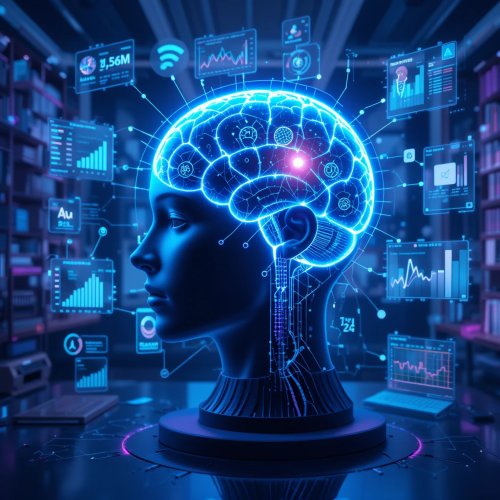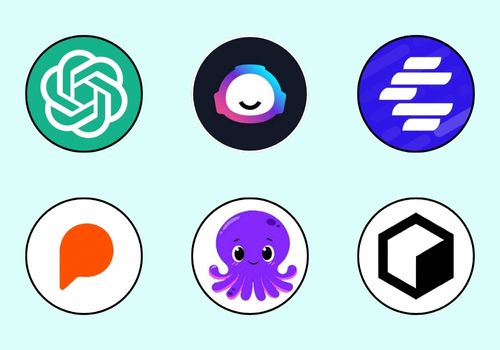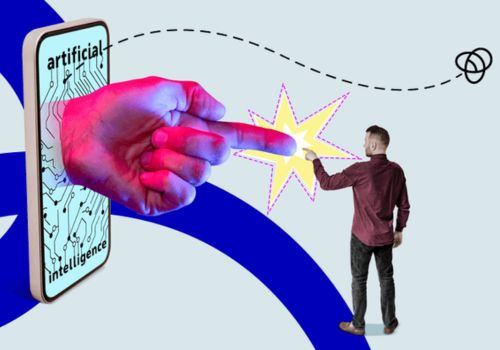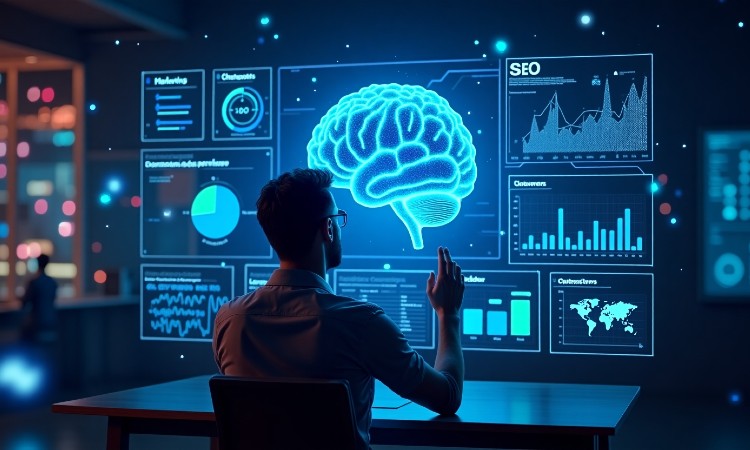The Role of AI in Digital Marketing: Things You Need to Know
|
Getting your Trinity Audio player ready...
|
Artificial Intelligence (AI) is transforming the digital marketing landscape, making it more efficient, data-driven, and customer-centric. Businesses are leveraging AI to automate tasks, personalize customer experiences, and analyze vast amounts of data to optimize campaigns. If you’re in the digital marketing space, understanding AI’s role is crucial for staying ahead of the competition. Let’s dive into how AI is shaping digital marketing and what you need to know.
Table of Contents
ToggleWhat is AI in Digital Marketing

AI in digital marketing refers to the use of machine learning, data analytics, and automation to enhance marketing strategies. It enables businesses to predict customer behaviour with up to 95% accuracy (Forbes), generate insights, and streamline marketing efforts.
AI-powered tools can help businesses automate email marketing, increasing open rates by up to 41% (Statista), optimize content for 30% higher engagement (HubSpot), and improve ad targeting, leading to 3X better conversion rates (Gartner).
These advancements make marketing more effective and cost-efficient, with AI-driven campaigns reducing costs by up to 50% while boosting ROI significantly.
Don’t Miss: What is Digital Marketing and How Does It Work?
11 AI Digital Marketing Tools

Here, we have provided a list of the 11 best AI digital marketing tools that can streamline content creation, SEO, social media, and automation.
- ChatGPT: A conversational AI model that generates human-like text, helping businesses create blog content, product descriptions, email responses, and chatbot interactions efficiently.
- Scalenut: AI-driven content marketing tool that automates keyword research, content creation, and SEO optimization, helping businesses generate high-quality content and improve search engine rankings efficiently.
- Jasper AI: An advanced AI writing assistant that generates marketing copy, blog posts, and email content, reducing writing time and maintaining brand voice consistency for businesses.
- Semrush AI Writing Assistant: Enhances content creation by suggesting SEO-friendly improvements, analyzing readability, and ensuring keyword relevance to boost rankings and organic traffic.
- Phrasee: Uses AI to optimize ad copy, email subject lines, and social media posts, ensuring maximum engagement and conversions with data-driven content suggestions.
- Pictory: Converts long-form content like blogs into short AI-generated videos, making it easier for marketers to repurpose content and increase engagement across social platforms.
- MarketMus: AI-powered content analysis tool that identifies topic gaps, provides keyword insights, and suggests improvements to create high-ranking and authoritative content.
- Chatfuel: A chatbot builder that automates responses on Messenger and Instagram, helping businesses enhance customer support, engage leads, and drive sales.
- Ocoya: AI-based social media management tool that generates captions, hashtags, and graphics while automating scheduling, making social media marketing more efficient.
- Surfer AI: AI-powered SEO tool that creates high-quality, optimized content by analyzing competitors, search intent, and keyword usage to improve website rankings.
- Brand24: A media monitoring tool that tracks brand mentions, sentiment analysis, and competitor insights, helping businesses manage their online reputation effectively.
These AI digital marketing tools enhance efficiency, boost engagement, and drive better results. Leverage them to stay ahead in the competitive landscape.
How to Use AI in Digital Marketing

Artificial Intelligence (AI) has revolutionized digital marketing by enhancing efficiency, accuracy, and personalization. Businesses can leverage AI to analyze data, automate tasks, and optimize marketing strategies for better engagement and conversions. Here’s how AI is transforming digital marketing and how you can use it effectively.
1. AI-Powered Content Creation
AI tools like ChatGPT, Jasper, and Copy.ai generate high-quality blog posts, product descriptions, and social media captions. These tools save time and help marketers produce engaging, optimized content tailored to their audience.
2. SEO Optimization with AI
AI-driven SEO tools such as Surfer SEO, Clearscope, and MarketMuse analyze search trends, suggest keywords, and optimize content structure. These tools improve search engine rankings by providing real-time recommendations based on data insights.
3. AI in Email Marketing
Platforms like Mailchimp and HubSpot use AI to personalize email campaigns, predict the best send times, and automate responses. AI improves open rates, click-through rates, and overall customer engagement.
4. AI Chatbots for Customer Engagement
AI chatbots such as Drift, ManyChat, and Intercom provide 24/7 customer support, answer queries, and guide users through the sales funnel. These bots enhance user experience and reduce response time, improving customer satisfaction.
5. AI in Social Media Management
Tools like Buffer, Hootsuite, and Sprout Social use AI to schedule posts, analyze engagement metrics, and suggest content strategies. AI-driven insights help brands maximize their reach and engagement across different social platforms.
6. AI for Predictive Analytics
AI-powered tools like Google Analytics, Pecan AI, and IBM Watson analyze user behavior, forecast trends, and recommend marketing strategies. Predictive analytics helps businesses make data-driven decisions for better ROI.
7. AI-Powered Advertising
Platforms such as Google Ads, Meta Ads, and Adzooma use AI to automate ad placements, optimize targeting, and enhance bidding strategies. AI ensures ads reach the right audience at the right time, improving conversion rates.
8. AI-Driven Video and Image Generation
AI tools like Runway ML, Synthesia, and Midjourney help create high-quality video content and visuals. These tools assist marketers in producing engaging, professional content without extensive technical skills.
9. AI in Voice Search Optimization
With the rise of voice assistants like Alexa, Siri, and Google Assistant, AI-driven SEO strategies now focus on voice search optimization. Businesses optimize content for conversational queries to capture voice search traffic.
10. AI for Personalization and Customer Experience
AI-powered recommendation engines, such as those used by Netflix and Amazon, analyze user behavior to deliver personalized product and content suggestions. Businesses can use similar AI solutions to improve user experience and increase sales.
AI is transforming digital marketing by automating tasks, enhancing personalization, improving customer engagement, and maximizing ROI. Integrate AI-driven tools to optimize strategies, boost efficiency, and stay ahead in the competitive digital landscape.
What are the Pros & Cons of AI Digital Marketing?

Artificial Intelligence (AI) is reshaping digital marketing by automating tasks, enhancing customer experiences, and optimizing campaigns. However, like any technology, AI presents both benefits and challenges. Let’s explore the pros and cons of AI in digital marketing.
Pros of AI in Digital Marketing
- Automation & Efficiency: AI automates repetitive tasks such as email marketing, content generation, and ad optimization, saving time and resources.
- Personalization & Customer Targeting: AI analyzes vast amounts of data to create hyper-personalized marketing campaigns, leading to better engagement and higher conversion rates.
- Improved Data Analysis: AI-powered tools provide deep insights into consumer behavior, helping businesses make data-driven decisions for more effective marketing strategies.
- Better Customer Support: Chatbots and AI-driven assistants provide 24/7 customer support, ensuring instant responses and improving user experience.
- Enhanced SEO & Content Optimization: AI helps optimize content for search engines by analyzing trends, keywords, and competitor strategies to boost rankings.
- Higher ROI & Cost-Effectiveness: AI-driven marketing tools reduce ad spend wastage and optimize campaigns, leading to a better return on investment (ROI).
Cons of AI in Digital Marketing
- Lack of Human Creativity: AI can generate content, but it lacks the human touch required for emotional connection and creative storytelling.
- High Implementation Costs: Integrating AI-powered tools into marketing strategies can be expensive, making it challenging for small businesses.
- Data Privacy Concerns: AI relies on collecting and analyzing vast amounts of user data, raising concerns about data security and privacy regulations.
- Over-Reliance on Automation: Excessive dependence on AI can reduce human involvement, potentially leading to a lack of originality in marketing campaigns.
- Requires Technical Expertise: AI tools require knowledge and expertise to be effectively implemented, which can be a challenge for businesses without tech-savvy teams.
AI in digital marketing offers unparalleled efficiency, personalization, and data-driven decision-making. However, businesses must balance AI automation with human creativity and address privacy concerns to maximize its benefits.
Fifth Shield
Fifth Shield is the best digital marketing company, offering expert solutions in SEO, SMO, Google Ads, and Meta Ads. With a data-driven approach, we help businesses boost online visibility, generate quality leads, and maximize ROI.
Our tailored strategies, innovative campaigns, and cutting-edge technology ensure measurable success. Whether it’s search engine optimization, social media marketing, or paid advertising, Fifth Shield delivers outstanding results. Partner with us to scale your brand and dominate the digital landscape.
Wrapping Up
AI in digital marketing is revolutionizing how businesses engage with customers, optimize campaigns, and drive conversions.
While AI-powered tools offer efficiency, personalization, and data-driven insights, they also come with challenges like privacy concerns and high implementation costs.
By strategically integrating AI with human creativity, businesses can leverage its potential for enhanced marketing performance. Staying informed about AI advancements and balancing automation with human input will help brands achieve long-term success in the ever-evolving digital landscape.
Don’t Miss: Why Digital Marketing is a Must for Every Business in 2025?







Write a Comment